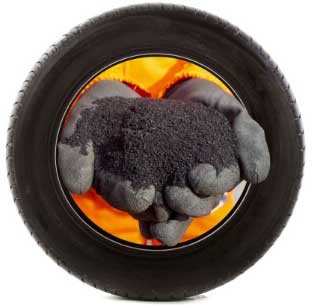Rubber Modified Asphalt
Turning old tyres into new roads
Rubber Modified Asphalt turns old tyres into new roads.
Tarmac has created an innovative asphalt mix using granulated rubber. Rubber modified asphalts incorporate recycled tyres combined with ULTILOW warm mix asphalt technology to provide an environmentally sustainable asphalt with a reduced carbon footprint.
The Rubber Modified Asphalt SMA is a direct alternative to 50 pen SMA and delivers the same performance and surface characteristics in terms of regularity and texture.
Tarmac is the first in the UK to develop a new asphalt technology capable of recycling end-of-life tyres (ELTs) into roads.
Tarmac’s Rubber Modified Asphalt has already been welcomed by highways professionals and representatives of the UK recycling industry.

Where can Rubber Modified Asphalt be used?
More sustainable road maintenance
Rubber modified asphalt can be used urban and carriageway highway schemes. It offers a more sustainable solution to maintenance and resurfacing of the local road network.
Rubber Modified Asphalt for carriageways
Rubber modified asphalt can be used urban and carriageway highway schemes. It is already in use on the UK Stretegic Road Network including a trial on the M1 and a number of local authority road networks.
Sustainable Asphalt for housing and office developments
Where developers are commited to a more sustainable construction methods, Rubber Modified Asphalt can be used for service roads and residential or commercial parking areas.
Why use Rubber Modified Asphalt?
Additional info
Around 40 million waste tyres are generated every year in the UK. Waste tyres are shredded and granulated to produce materials that can be used in sports pitches and safety surfaces under playground equipment.
Waste tyres are also used as a fuel for cement kilns and on a small scale for engineering and agricultural applications.
Despite these alternative uses, around one in four of these waste tyres are still exported, mainly to Asia.
Rubber Modified Asphalt incorporate the rubber from one tyre per tonne of asphalt, giving the potential to recycle about 500 tyres per kilometre of road, depending on layer thickness.
The reinforcing steel from truck tyres is also recycled to make new steel. Fibres and fine dust from the recycling process, which have no alternative uses, are used as a fuel in our cement kilns.
Tarmac has supplied Rubber Modified Asphalt to several local authority clients and are building the client base for this environmentally sustainable asphalt.
Rubber is used in asphalt across the USA, predominately within a pre-blended bitumen but in the UK there is a lack of the necessary industrial infrastructure required to allow manufacture of this type of material.
Tarmac has been exploring the use of tyre rubber in asphalt since 2011 with a focus on using tyres that are recycled in the UK. The development has led to an optimised mix design, combined with a computer controlled process for direct addition of finely ground tyre rubber into the asphalt mixing plant.
The result is a high level of quality control and consistent product performance.
Successful UK trials
Tarmac laid a number of trial mixes on a site in North Tyneside in 2013. The site has been regularly inspected and is still in excellent condition indicating that it will give many more years of service. No maintenance interventions have been required since the trial sections were installed.
In 2018 Tarmac were approached by Coventry City Council who were keen to trial asphalt that provided additional environmental benefits to standard asphalts. The first sites in Coventry to use rubber modified 10mm SMA were laid in May and July 2018, followed by a rubber modified 6mm SMA in August 2018. Further rubber modified SMA has been laid in 2019.
In May 2019 a National Highways funded trial of rubber modified asphalt was undertaken on a south bound section of the M1 near Leicester, between junctions 23 to 22.
This trial involved an even higher rubber addition rate as we explore further, with National Highways, the development of a higher flexibility mix delivering low grade PMB mix equivalence.
Case studies
Rubber Modified Asphalt Contact
Downloads
Download files individually or add multiple files to a zip folder.



